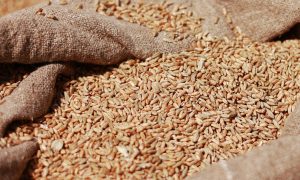Pakistan : New wheat policy aims at food security and farmer support

Pakistan’s upcoming National Wheat Policy, outlined by Minister Rana Tanveer Hussain, will focus on fairness, sustainability, and resilience. The strategy includes fair farmer prices, targeted subsidies for low-income families, strategic reserves in modern silos, climate-resilient varieties, and wheat fortification to combat malnutrition, ensuring food security and stability against global and climate challenges.
Minister for National Food Security and Research Rana Tanveer Hussain on Wednesday underlined that the upcoming National Wheat Policy will be guided by the principles of fairness, sustainability, and resilience.
Chairing a meeting to finalize the contours of the National Wheat Policy and the Wheat Management Strategy for 2025/26 and beyond, the minister said the roadmap will serve as a long-term framework to ensure food security, safeguard farmers’ interests, protect consumers, and prepare for climate-induced challenges.
“Wheat is more than just a crop; it is a lifeline for millions of Pakistanis,” Hussain remarked, adding that the new policy will balance the needs of farmers, consumers, and the state.
He explained that farmers must be offered prices aligned with international markets to motivate higher production, while middle- and upper-income groups will pay market-based rates. For low-income households, subsidies and targeted relief will be provided, with fiscal responsibilities shared between the federal and provincial governments.
The minister emphasized the importance of building strategic wheat reserves, which will be stored in modern silos to minimize climate risks and quality deterioration. The federal government, he added, will oversee reserve management, ensure wheat quality, support vulnerable families, and improve efficiency in the supply chain.
Research and development will also play a pivotal role in the new strategy. Efforts will focus on developing climate-resilient, high-yield wheat varieties, farmer welfare programs, and modernized storage solutions.
Highlighting the nutritional dimension, Hussain noted that over 30 percent of women and children in Pakistan suffer from deficiencies in zinc, iron, and vitamins. To tackle malnutrition and stunting, the policy will encourage multi-grain flour consumption, promote wheat fortification, and incentivize proper storage to preserve nutritional content. These interventions, he said, will directly benefit mothers and children while strengthening national productivity.
Reassuring citizens, the minister stated: “Pakistan will not allow a roti crisis to emerge.” He reaffirmed the government’s commitment to fair farmer returns, price stability, and resilience against global market volatility and natural disasters.
To Read more about Wheat News continue reading Agriinsite.com
Source : Minute Mirror















